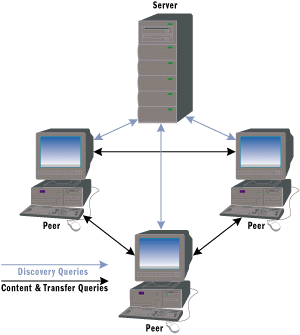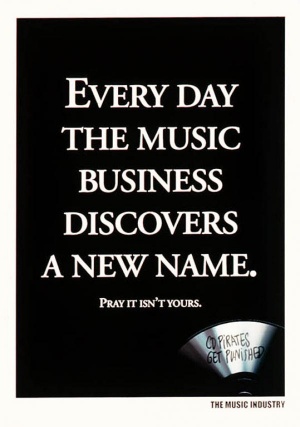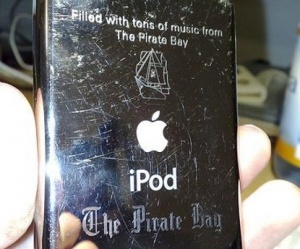Difference between revisions of "File Sharing"
(→Legality) |
m (→Legality) |
||
| Line 16: | Line 16: | ||
==Legality== | ==Legality== | ||
| − | Although file sharing is not illegal, it has been the subject of many recent lawsuits. Currently, there are many artists that support open source file sharing and see it as a way to cheaply promote their music. Also, it's important to realize that ''file hosting services'' do not actively monitor the content being transferred by users. So, although the site itself is legal, the files (or music) being uploaded on the site may not be. | + | Although file sharing is not illegal, it has been the subject of many recent lawsuits. Currently, there are many artists that support open source file sharing and see it as a way to cheaply promote their music. Also, it's important to realize that ''file hosting services'' do not actively monitor the content being transferred by users. So, although the site itself is legal, the files (or music) being uploaded on the site may not be. The Pirate Bay, a poplar source of files for P2P sharing, has received many legal threats from within and outside of Sweden, the country in which it is based, and they are well known for their sometimes humorous responses. They post all of these threats with their responses on their website<ref>http://thepiratebay.org/legal</ref>. |
===Collaboration and search engines=== | ===Collaboration and search engines=== | ||
Revision as of 05:05, 18 December 2011
File sharing is the ability to transmit or “share” files from one computer to another over the Internet. Such files may include software, music, videos, images, documents, and books. There are two main types of file sharing. One is peer-to-peer file sharing (P2P). In P2P file sharing, clients utilize software to search for shared files on the computers of other users and download their chosen files directly from other people on the network. An alternative to peer-to-peer software is called file hosting service. These services are offered by sites that host files and allow users to download them directly through links. An example of a current file hosting service is MediaFire. This site is most commonly known for the users ability to search for song titles and download them from the links the site provides.Contents
History
The history of file sharing dates back to 1971 when the 8 inch floppy diskette was invented by IBM. [1] It rapidly won its acceptance as a useful data storage medium. Floppy disks allowed users to transfer files from one drive to another. In 1990, the World Wide Web (WWW) was officially proposed. The WWW provided users with easy access to file sharing. Within the next year, the MP3 standard is introduced.[2] This was the turning point which ultimately lead to Digital Piracy.
The first MP3 player was released in 1997 and it was called the MPMan F10. A year later the Digital Millennium Copyright Act was passed and was used as a weapon of piracy destruction and was greatly used in many legal actions against file sharing services[3].
In 1999 Shawn Fanning created Napster. Napster is an online music sharing software. A user could selectively download specific songs from other users that had purchased CD’s and made them available to other users on Napster. Napster's method of sharing music directly violated copyright law. Just two years after Napster was created, the music industry organized a copyright infringement suit against them. Napster was immediately shut down in 2001. That same year, BitTorrent and LimeWire were released. BitTorrent is a peer-to-peer communications protocol for file sharing. The most famous site is The Pirate Bay (TPB) which was released in 2003. TPB allows users to share electronic files. As of 2011, it has over 5 million registered users and hosts more than 3.5 million torrent files.[4]
LimeWire is a free peer-to-peer file sharing software program. In 2010, LimeWire was forced shut down by recording companies, but the network still remains available in open source clients like Frostwire. In March of 2011, thirteen recording companies are attempting to sue LimeWire for $75 trillion. [5]
Legality
Although file sharing is not illegal, it has been the subject of many recent lawsuits. Currently, there are many artists that support open source file sharing and see it as a way to cheaply promote their music. Also, it's important to realize that file hosting services do not actively monitor the content being transferred by users. So, although the site itself is legal, the files (or music) being uploaded on the site may not be. The Pirate Bay, a poplar source of files for P2P sharing, has received many legal threats from within and outside of Sweden, the country in which it is based, and they are well known for their sometimes humorous responses. They post all of these threats with their responses on their website[6].
Collaboration and search engines
Links to files available from file hosts are often posted on Internet collaboration tools such as email, message boards, blogs and other mediums through which these links can be gathered. Such mediums just offer links to such files instead of actually hosting files themselves. Many of these sites are hosted on offshore servers that reside outside of US jurisdiction. Most of these sites have a clause in their Terms of Service that pass on responsibility to the users.
There are also search engines, like Filestube that search various file hosts for content. They are almost exclusively used for finding illegal content. Like stated previously, Filestube passes on responsibility to its users in the following provision of its TOS:
Note that FilesTube has no way to determine which files have a copyright and which do not. FilesTube does not nor will ever store any files on its own servers. Users should use their own judgment when downloading files from other internet servers which could possibly infringe upon any copyright. Please note that content such as mp3/wma music files, mp4/mpg/avi video or movie downloads, ebooks, games or software might be protected by copyrights and legally cannot be downloaded. FilesTube cannot determine which links refer to the copyrighted materials and which do not, so this is left to discretion of the User.[7]
Ethical Implications
There are an estimated 700 million copyright-infringed music files on the Internet.[8] But this was not the original reason file sharing was created. There are also just as many cases of legal sharing of free/open source software, games, music, books, or other forms of media. Because file sharing is used for everything from illegal downloading to sharing collaborative documents or a local artist gaining popularity for his music through free downloads, ethical arguments appear on both sides of the spectrum, both in favor and against file sharing. It is interesting to note that in 2009, fifty-eight percent of Americans who follow the file sharing debate said that in a few cases, file sharing is appropriate. In this study, within the group of 18-29 year olds, seventy-percent of respondents favored file sharing [9].
Support
Proponents of file sharing have two main arguments. One is that file sharing actually increases the sale of music. As users can sample more music, they are more likely to purchase that music at a later date. The second point coincides with the first stating that people who download from peer-to-peer (P2P) sites would not have purchased the music in the first place.[10] Other proponents argue that since music is more widespread and easy to acquire, it helps in promoting it across various pathways. Despite the unethical nature of downloading music illegally, many people partake in it because of the faceless nature of it. Since people can download music anonymously in the comfort of their own home, they are more inclined to do so and rationalize their actions accordingly. Even though most people know downloading music is unethical, they do it nonetheless because of this false rationalization.
Opposition
Those against file sharing argue such things as intellectual property, theft, copyrights, and the downfall of the music industry. That is, when someone downloads a CD, they are stealing property from the artist.[11] Downloading music illegally is potentially allowing thousands of other people to download the music from you. Therefore, downloading music online can potentially lead to millions of dollars of lost revenue for the recording company. The greatest reason against downloading or sharing music is piracy, or “the unauthorized use or reproduction of another’s work."[12] Since most of the music that is shared is copyrighted, downloading, distributing, or sharing it violates intellectual property rights.[13]
Other facts to consider
The number of users of P2P websites has decreased dramatically in the past few years. Market research firm NPD group said that P2P use has dropped from 16 percent of all US Internet users to 9 percent over the last three years.[14] Attributed to the fall of the major players in the file sharing industry, there is less of space for Internet users to find and download material. This could only add to a debate where file sharing users could say the problem is decreasing.
Government intervention
Recently, the government has been cracking down on violations of intellectual property rights. Corporations and lobbyists have succeeded in extending intellectual property rights, and new laws have also been created to prevent the violation of these rights.[15]
File Hosting
| Site Name |
|---|
| Depositfiles |
| eDonkey |
| Fileserve |
| FileSonic |
| Gnutella |
| Hotfile |
| Hulkshare |
| LimeLinx |
| MediaFire |
| MegaShares |
| MegaUpload |
| Oron |
| Rapidshare |
| Sendspace |
| Wupload |
| ZippyShare |
Torrent Sites
Examples of working torrents:
| Torrent Site | Specialization | Private? |
|---|---|---|
| AnimeSuki | Anime | No |
| BitTorrent | None | No |
| BitGamer | Games | Yes |
| Btjunkie | None | No |
| CinemaTorrents | Film | No |
| ClearBits | Legally re-distributable media | No |
| Demonoid | None | Yes |
| eBookVortex | eBooks | No |
| etree | Live Concerts | No |
| ExtraTorrent | None | No |
| KickassTorrents | None | No |
| MyAnonamouse | eBooks and audiobooks | Yes |
| Mininova | None | No |
| Pass The Popcorn | Movies | Yes |
| Pirate Bay, The | None | No |
| Rutracker.org | None | No |
| Torrentech | Electronic music | No |
| Zoozie | None | No |
References
- ↑ Computer History Museum. Retrieved 2011-10-08.
- ↑ Timeline of file sharing. Retrieved 2011-10-08.
- ↑ Nistor, Codrut. File Sharing – History. PCTips3000. 2009-06-34. Retrieved 2011-10-08.
- ↑ The Pirate Bay. Retrieved 2011-10-08.
- ↑ Plafke, James. LimeWire is Being Sued for Up to $75 Trillion, Judge Thinks It’s “Absurd”. Geekosystem. 2011-05-23. Retrieved 2011-10-08.
- ↑ http://thepiratebay.org/legal
- ↑ FilesTube Terms. 2011-05-09. Retrieved 2011-12-13.
- ↑ Plowman, Sacha, and Sigi Goode. “Factors Affecting the Intention to Download Music: Quality Perceptions and Downloading Intensity.” Control 49.2004 (2009) : 84-97.
- ↑ http://www.cbsnews.com/stories/2003/09/18/opinion/polls/main573990.shtml
- ↑ http://www.heritage.org/research/reports/2004/08/internet-file-sharing-the-evidence-so-far-and-what-it-means-for-the-future
- ↑ http://www.copyrightguru.com/file_sharing_faq.htm#Is%20file-sharing%20ethical
- ↑ http://dictionary.reference.com/browse/piracy
- ↑ Shang, R., Chen, Y., & Chen, P. (2008). Ethical decisions about sharing music files in the p2p environment. Journal of Business Ethics, 80, 349-365.
- ↑ http://arstechnica.com/tech-policy/news/2011/03/only-9-and-falling-of-us-internet-users-are-p2p-pirates.ars
- ↑ Stahl, B. C. (2008). Ethical issues of information and business. In K. Himma & H. Tavani (Eds.), The Handbook of Information and Computer Ethics (pp. 311-330). John Wiley & Sons, Inc.




